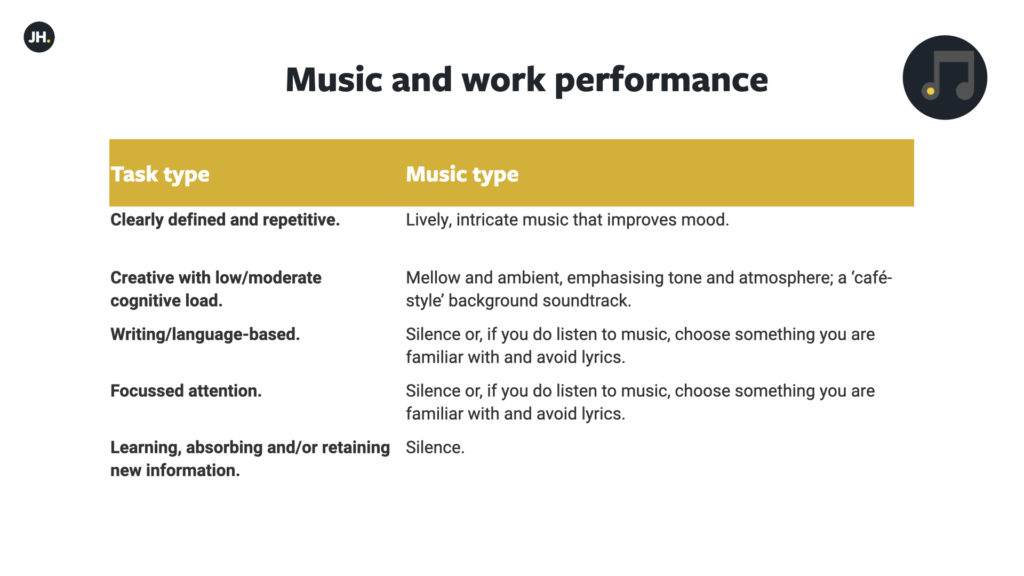My noise-cancelling headphones are one of the best purchases I have ever made. I heard someone describe them as a ‘glass of wine for the ears’. I can relate. Whether I’m working on a plane, in a hotel lobby, a shared office, or at home, I relish the bubble of tranquillity that this technology can create, whenever I need it. Read on to find out more about the science of music, cognitive performance and productivity, to help you decide the best way to boost your output and block-out the world around you.
The effect of music on work performance
Sometimes I’ll listen to music, either because I feel that it can help my productivity, or as a way to blanket background noise that can’t be annulled by the noise-cancelling technology. But I’ve often wondered whether there is an optimal musical choice to accompany my work, so I decided to dig into some scientific literature, to find out.
A significant number of people listen to music while they work. A recent study suggests that between 63 and 88.2% of participants listened to music at work, at least some of the time and that they reported that this lifted their mood, made them feel more relaxed and motivated1. But what does this mean for performance, because we know that music has a powerful effect on our brains? Even the anticipation of hearing a particular section of a track that we love is linked with dopamine release and brain activity associated with reward and motivation2.
The Mozart effect – fact or fiction?
At the end of the 20th century, the media went wild for the “Mozart-effect” when a 1993 study suggested that listening to Mozart before an IQ test improved spatial-temporal reasoning (the ability to conceptualise the three-dimensional relationships of objects in space and to manipulate them mentally)3. However, a later study4 and meta-analyses which reviewed nearly 40 studies, including over 3000 subjects, suggested that the improvements were less likely to be due to the unique performance-enhancing qualities of Mozart, and more likely to relate to the increases in positive mood associated with listening to the music5. So, what is the real story? Should we be listening to music while we work? If so, is there an optimal genre, and does the type of work we are doing make a difference?How can you use music to boost your mental performance?
While music’s influence on performance appears to have more to do with our fondness for the music than it does to do with the specific type of music6, it’s still possible for music to impair performance, even if you enjoy it. The data, based on the most recent evidence7, suggests that the effect of music on performance depends on three factors:- The task
- The type of music
- The performer

Music helps with repetitive task performance
Music seems to be particularly beneficial for performance in repetitive tasks8. In this case, almost any music appears to be helpful, providing it is perceived as enjoyable by the listener, as the primary effect seems to be the ‘activation’ effect of the music, breaking up the monotony and improving mood.Music hinders complex task performance
In tasks which require a high degree of concentration, music can impair performance, particularly if this music has an intricate style and is played loudly7,9. Music with familiar lyrics appears to be particularly harmful for performance in demanding cognitive tasks. When intense focus and concentration is required, working in silence is probably the best option, regardless of personality or preference10.
What about noise when working in cafés?
I find that working in a café type environment, where the background murmur is not too loud, but not too quiet, is a great place to think up new content ideas. There is some scientific evidence to support this experience11. Researchers examined the relationship between background noise and performance by creating an artificial soundtrack composed of multi-talker sound (several people having conversations), café sounds, roadside traffic, and distant construction noise, to create a continually varying source of background noise.
Moderate levels of background noise may improve creative task performance
Across a series of five experiments, the researchers concluded that moderate levels of background noise increased productivity for creative tasks, compared to no sound. However, as your experience may also support, a medium volume turned out to be the best. Low (50db) and high volumes (85db) were not so beneficial.
The effect depends on the listener
The performer’s previous experience of working with music also plays a role in the benefits they may experience1. People with a habit of listening to music while working may experience greater benefits. Preference for external stimulation while working is also a factor7. People who prefer more external stimulation may be more likely to experience positive effects. Additionally, personality has an influence. Extroverts may be more likely to enjoy and benefit from listening to music while working12 but, as I mentioned previously, the effect of music ultimately depends on how much the listener enjoys the music13.
Providing you bear in mind the recommendations above, over time, listening to the music you like, when you want, could be beneficial for:
- Increasing positive mood.
- Improving quality-of-work
- Enhancing efficiency by reducing the time spent on tasks
These findings have been supported by studies carried out in real work settings14.
Music choice cheat sheet

Summary
- Music generally makes complex task performance worse.
- Complex music generally improves repetitive and straightforward task performance.
- Beware music with lyrics and music with which you are familiar.
- If you notice that you’re getting distracted by the music, but need some soundtrack to drown out other noise, try out an artificial soundtrack (such as café noise) or an ambient nature sound playlist.
- Personal preference, both for the specific type of music and for external stimulation while working in general, plays a vital role in determining whether the music will be beneficial for performance.
- Whatever you choose, find something that makes you feel good.
References
1. Barton L, Candan G, Fritz T, Zimmermann T, Murphy GC. The sound of software development. IEEE Softw. 2019;(March/April 2020):78–85.
2. Salimpoor VN, Benovoy M, Larcher K, Dagher A, Zatorre RJ. Anatomically distinct dopamine release during anticipation and experience of peak emotion to music. Nat Neurosci [Internet]. 2011;14(2):257–64. Available from: http://dx.doi.org/10.1038/nn.2726
3. Raucher FH, Shaw GL, Ky NN. Music and spatial task performance. Nature. 1993;365(October):611–2.
4. Chabris CF, Steele KM, Dalla Bella S, Peretz I, Dunlop T, Dawe LA, et al. Prelude or requiem for the “Mozart effect”? Nature. 1999;400(6747):826–8.
5. Pietschnig J, Voracek M, Formann AK. Mozart effect-Shmozart effect: A meta-analysis. Intelligence [Internet]. 2010;38(3):314–23. Available from: http://dx.doi.org/10.1016/j.intell.2010.03.001
6. Huang RH, Shih YN. Effects of background music on concentration of workers. Work. 2011;38(4):383–7.
7. Gonzalez MF, Aiello JR. More than meets the ear: Investigating how music affects cognitive task performance. J Exp Psychol Appl. 2019;25(3):431–44.
8. Landay K, Harms PD. Whistle while you work? A review of the effects of music in the workplace. Hum Resour Manag Rev [Internet]. 2019;29(3):371–85. Available from: https://doi.org/10.1016/j.hrmr.2018.06.003
9. Anderson SA, Fuller GB. Effect of music on reading comprehension of junior high school students. Sch Psychol Q. 2010;25(3):178–87.
10. Avila C, Furnham A, McClelland A. The influence of distracting familiar vocal music on cognitive performance of introverts and extraverts. Psychol Music. 2012;40(1):84–93.
11. Mehta R, Zhu R (Juliet), Cheema A. Is Noise Always Bad? Exploring the Effects of Ambient Noise on Creative Cognition. J Consum Res. 2012;39(4):784–99.
12. Furnham A, Strbac L. Music is as distracting as noise: The differential distraction of background music and noise on the cognitive test performance of introverts and extraverts. Ergonomics. 2002;45(3):203–17.
13. Johansson R, Holmqvist K, Mossberg F, Lindgren M. Eye movements and reading comprehension while listening to preferred and non-preferred study music. Psychol Music. 2012;40(3):339–56.
14. Lesiuk T. The effect of music listening on work performance. Psychol Music. 2005;33(2):173–91.





